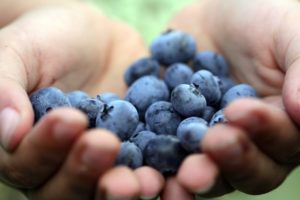
A new research study published in the American Journal of Clinical Nutrition found that participants with metabolic syndrome who consumed the equivalent of one cup of fresh blueberries per day, given as 26g of freeze-dried blueberries, showed positive changes in measures of heart health.
Specifically, the study participants who ate one cup of blueberries per day significantly increased their “good cholesterol” levels. They also improved their endothelial function and reduced arterial stiffness – both of which are associated with a reduced risk of heart attack and stroke.
Over six months of study, participants with metabolic syndrome were randomly assigned to receive one of three daily treatments: 26g freeze-dried blueberries per day, 13g freeze-dried blueberries per day, or a placebo powder with the same color, taste, and consistency as freeze-dried blueberries.
All study participants were instructed to limit the intake of other anthocyanin containing foods to ensure benefits were from the blueberries. Anthocyanins are heart-healthy constituents that give blueberries their blue-purple color. Anthocyanins are also found in fruits and vegetables such as black grapes, raisins, blackberries, plums, purple cabbage, eggplant, purple cauliflower, and purple potatoes. Participants also refrained from blueberry intake beyond the assigned daily treatments.

Metabolic syndrome is a group of risk factors that includes low levels of HDL-C, or "good cholesterol," high blood pressure, increased abdominal obesity, high triglyceride levels, and elevated fasting glucose levels.
These risk factors increase a person’s risk for heart disease and other health problems, such as type 2 diabetes and stroke. Several other risk factors also increase your chances of developing metabolic syndrome: an inactive lifestyle, insulin resistance in which the body can't use insulin efficiently, gender, and race. Men are more likely than women to develop metabolic syndrome.
And when whites and blacks have the same body mass index (BMI), whites are at a greater risk than blacks. Metabolic syndrome represents a health challenge that impacts more than one-third of the U.S. population.
Blueberries are convenient, versatile, and filled with nutritional goodness. Fresh or frozen blueberries are a nutrition powerhouse loaded with vitamins and minerals, such as vitamin C, vitamin K, manganese, and potassium. Blueberries are also a good source of fiber, containing 3.6 grams of fiber per cup.
The following tips will help you successfully make blueberries part of your meal plan.
When to buy. Although peak blueberry season in the U.S. runs from April to late September, fresh blueberries are available year-round. From October to March, fresh blueberries are imported from South America.
How to buy. When you buy fresh blueberries, look for berries that are dry, firm, plump and smooth-skinned, with a dusty blue color and uniform size. The color of the blueberry is a good indicator of maturity. Blueberries should be deep purple-blue to blue-black.
How to store. Refrigerate fresh blueberries in their original plastic package, a covered bowl, or container. Do not wash blueberries before storing them. Refrigerated blueberries will remain fresh up to 10 days of purchase. Don’t forget to wash your fresh blueberries just before you eat them. Fresh frozen berries can be stored in the freezer for up to 10 months.
How to eat. Blueberries are best enjoyed fresh to retain all the nutritional goodness and great taste. Eat them by the handful for a snack, sprinkle on breakfast cereal, mix them in smoothies, or pour them over yogurt or ice-cream.
Bon Appétit!
 Constance Brown-Riggs, is a registered dietitian, certified diabetes educator, national speaker and author of the Diabetes Guide to Enjoying Foods of the World, a convenient guide to help people with diabetes enjoy all the flavors of the world while still following a healthy meal plan. Follow Constance on social media @eatingsoulfully
Constance Brown-Riggs, is a registered dietitian, certified diabetes educator, national speaker and author of the Diabetes Guide to Enjoying Foods of the World, a convenient guide to help people with diabetes enjoy all the flavors of the world while still following a healthy meal plan. Follow Constance on social media @eatingsoulfully









